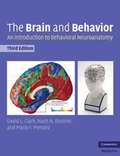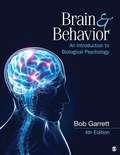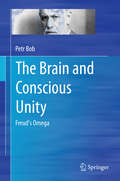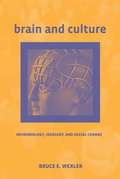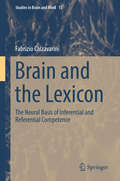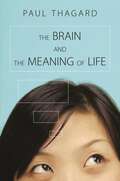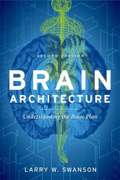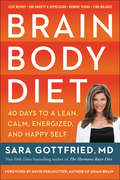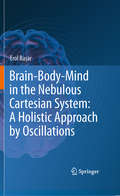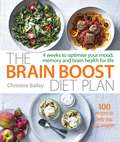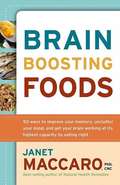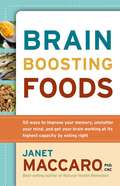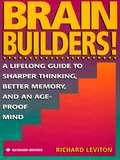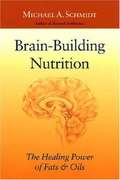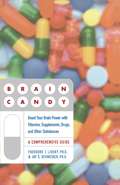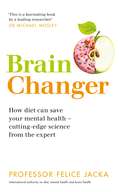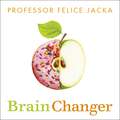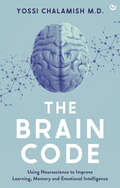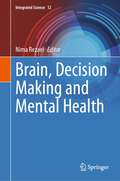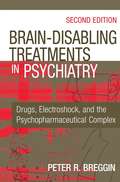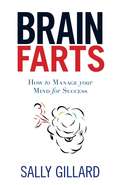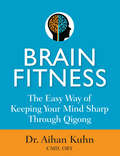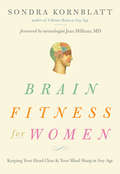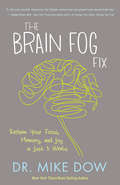- Table View
- List View
The Brain and Behavior
by David L. Clark Nash N. Boutros Mario F. MendezNow in its third edition, The Brain and Behavior continues on its mission to present a simplified and accessible introduction to behavioral neuroanatomy. Human behavior is a direct reflection of the anatomy of the central nervous system, and it is the goal of the behavioral neuroscientist to uncover its neuroanatomical basis. Much of the new content in this edition reflects advances in functional magnetic resonance imaging. The text is presented in a highly structured and organized format to help the reader distinguish between issues of anatomical, behavioral and physiological relevance. Simplified and clear diagrams are provided throughout the chapters to illustrate key points. Case examples are explored to set the neuroanatomy in the context of clinical experience. This will be essential reading for behavioral clinicians including psychiatrists, neuropsychiatrists, neurologists, psychologists and clinical neuroscientists.
Brain and Behavior: An Introduction to Biological Psychology (Fourth Edition)
by Bob L. GarrettThe Fourth Edition of Brain & Behavior: An Introduction to Biological Psychology by Bob Garrett showcases our rapidly increasing understanding of the biological foundations of behavior, engaging students immediately with easily accessible content. Bob Garrett uses colorful illustrations and thought-provoking facts while maintaining a "big-picture" approach that students will appreciate. Don't be surprised when they reach their "eureka" moment and exclaim, "Now I understand what was going on with Uncle Edgar!" " [T]he topic coverage is excellent. It is what a student taking an Introductory Biological Psychology course should walk away with. " --William Meil, Indiana University of Pennsylvania "I absolutely love this book. I think it is head and shoulders above any other. . . . The book is just right. I have used every edition so far and students seem to read it and grasp the concepts well. It is clearly written, well illustrated, and explains concepts in an engaging and understandable way. The text reads like it should--a wonderfully written book. It almost reads like a novel, progressing through the topics with a fluency that is rare. It's perfect for my students. " --Carol L. DeVolder, St. Ambrose University "The text is well organized and has excellent artwork depicting complex brain functions. " --Dr. Catherine Powers Ozyurt, Bay Path College "Excellent use of artwork, good coverage of a range of topics within each chapter. " --M. Foster Olive, Arizona State University
The Brain and Conscious Unity
by Petr BobIn this provocative text, a noted neuroscientist reexamines Freud's posthumously published Project of Scientific Psychology in the light of modern neuroscience. This expanded "thermodynamics of the mind" model includes robust conceptions of the cellular and neural processes that accompany creation of consciousness and memory, their contributions to such conditions as depression, dissociative disorders, and schizophrenia, and implications for practice, from imaging to talk-based therapies to pharmacotherapy. Central to this construct is Freud's proposal of specific "omega" neurons as the most volatile carriers of consciousness between mind and brain, which is applied to current issues regarding complexity and executive functioning. In addition, the book is extensively referenced, allowing readers to investigate these and related phenomena in greater detail. Among the topics covered: Neural reductionism in Freud's "Project" and neuropsychoanalysis. Thermodynamics and brain self-organization. Conflicting information and the dissociated mind. The Cartesian model of the mind and the binding problem. Neuroendocrine and immune response to stress. The concept of omega neurons and modern chaos theory. Rigorous, challenging, and occasionally startling, The Brain and Conscious Unity is a milestone in the neuroscience and mind/brain literature to be read and discussed by psychiatrists, psychologists, and neuropsychologists.
Brain and Culture: Neurobiology, Ideology, and Social Change
by Bruce E. WexlerChoice Outstanding Academic Title, 2007. Research shows that between birth and early adulthood the brain requires sensory stimulation to develop physically. The nature of the stimulation shapes the connections among neurons that create the neuronal networks necessary for thought and behavior. By changing the cultural environment, each generation shapes the brains of the next. By early adulthood, the neuroplasticity of the brain is greatly reduced, and this leads to a fundamental shift in the relationship between the individual and the environment: during the first part of life, the brain and mind shape themselves to the major recurring features of their environment; by early adulthood, the individual attempts to make the environment conform to the established internal structures of the brain and mind. In Brain and Culture, Bruce Wexler explores the social implications of the close and changing neurobiological relationship between the individual and the environment, with particular attention to the difficulties individuals face in adulthood when the environment changes beyond their ability to maintain the fit between existing internal structure and external reality. These difficulties are evident in bereavement, the meeting of different cultures, the experience of immigrants (in which children of immigrant families are more successful than their parents at the necessary internal transformations), and the phenomenon of interethnic violence. Integrating recent neurobiological research with major experimental findings in cognitive and developmental psychology--with illuminating references to psychoanalysis, literature, anthropology, history, and politics--Wexler presents a wealth of detail to support his arguments. The groundbreaking connections he makes allow for reconceptualization of the effect of cultural change on the brain and provide a new biological base from which to consider such social issues as "culture wars" and ethnic violence.
Brain and the Lexicon: The Neural Basis of Inferential and Referential Competence (Studies in Brain and Mind #15)
by Fabrizio CalzavariniThis monograph offers a novel, neurocognitive theory concerning words and language. It explores the distinction between inferential and referential semantic competence. The former accounts for the relationship of words among themselves, the latter for the relationship of words to the world. The author discusses this distinction at the level of the human brain on both theoretical and neuroscientific grounds. In addition, this investigation considers the relation between the inf/ref neurocognitive theory and other accounts of semantic cognition proposed in the field of neurosemantics, as well as some potential implications of the theory for clinical neuroscience and the philosophy of semantics. Overall, the book offers an important contribution to the debate about lexical semantic competence. It combines a strong philosophical and linguistic background with a comprehensive and critical analysis of neurosemantic literature. Topics discussed lie at the intersection of philosophical semantics, linguistics, neurolinguistics, cognitive science, artificial intelligence, cognitive neuroscience, and clinical psychology. Due to its interdisciplinary orientation, coverage is rich in introductory remarks and not overly technical, therefore it is accessible to non-experts as well.
The Brain and the Meaning of Life
by Paul ThagardHow brain science answers the most intriguing questions about the meaning of lifeWhy is life worth living? What makes actions right or wrong? What is reality and how do we know it? The Brain and the Meaning of Life draws on research in philosophy, psychology, and neuroscience to answer some of the most pressing questions about life's nature and value. Paul Thagard argues that evidence requires the abandonment of many traditional ideas about the soul, free will, and immortality, and shows how brain science matters for fundamental issues about reality, morality, and the meaning of life. The ongoing Brain Revolution reveals how love, work, and play provide good reasons for living.Defending the superiority of evidence-based reasoning over religious faith and philosophical thought experiments, Thagard argues that minds are brains and that reality is what science can discover. Brains come to know reality through a combination of perception and reasoning. Just as important, our brains evaluate aspects of reality through emotions that can produce both good and bad decisions. Our cognitive and emotional abilities allow us to understand reality, decide effectively, act morally, and pursue the vital needs of love, work, and play. Wisdom consists of knowing what matters, why it matters, and how to achieve it.The Brain and the Meaning of Life shows how brain science helps to answer questions about the nature of mind and reality, while alleviating anxiety about the difficulty of life in a vast universe. The book integrates decades of multidisciplinary research, but its clear explanations and humor make it accessible to the general reader.
Brain Architecture: Understanding the Basic Plan
by Larry W. SwansonNow in its second edition, Brain Architecture is the continued exploration of how the brain works. At the very core of our existence, the brain generates our thoughts and feelings, directs our voluntary interactions with the environment, and coordinates all of the vital functions within the body itself. This long-overdue new edition explains this oftentimes daunting intricacy and exquisite detail. The first half of the book discusses the basic parts and how they work, presenting an overview of the nervous system at both the microscopic and macroscopic levels. The approach follows three classic lines of thought that proceed from simple to complex: the history of neuroscience research, the evolution of the nervous system, and the embryological development of the vertebrate central and peripheral nervous systems. The second half of the book outlines the basic wiring diagram of the brain and nervous system-how the parts are interconnected and how they control behavior and the internal state of the body. This is done within the framework of a new four-system network model that greatly simplifies understanding the structure-function organization of the nervous system. Written in clear and sparkling prose, beautifully illustrated, and thoroughly updated,Brain Architecture, Second Edition is must-read for anyone interested in the science of how the brain works.
Brain Body Diet: 40 Days to a Lean, Calm, Energized, and Happy Self
by Sara GottfriedThe multiple New York Times bestselling author and Harvard-MIT educated women’s health expert delivers a revolutionary 40-day program to reconnect the brain and body to prevent and reverse the myriad symptoms and diseases afflicting millions of women.Do you struggle to lose weight or to fall and stay asleep at night? Do you feel lethargic and a depressed? Do you endure irregularity or other digestive problems? Do you want to feel better and happier and to maximize your health and longevity?Dr. Sara Gottfried has the answer. Your health problems, she reveals, are in your head—caused by a malfunction in the connection between your brain and your body. Brain health is a powerful indicator of overall health and well-being. While our thoughts can affect our physical health, what we do to our body also has a lasting impact on our brains. When you ignore your brain-body symptoms, you raise your risk of serious cognitive decline, which leads to chronic health problems. It’s a vicious cycle, but it can be broken, Gottfried argues. In Brain Body Diet she shows how brain body health is the key to reversing a myriad of chronic symptoms—empowering you to live up to our potential and achieve the lasting health you desire. The relationship between the body and the brain is necessary to function at our best today and for the rest of our lives. Designed for the female brain—which is different from the male brain—her breakthrough protocol will help you lose weight, get off harmful prescription medications, boost energy and mental functioning, and alleviate depression and anxiety in less than six weeks. Filled with incredible success stories, the most up-to-date scientific research, and the rich insights that are the hallmarks of her previous bestsellers, Brain Body Diet will completely change the way you look at your life and help you achieve total body health.
Brain-Body-Mind in the Nebulous Cartesian System: A Holistic Approach By Oscillations
by Erol BaşarBrain-Body-Mind in the Nebulous Cartesian System: A Holistic Approach by Oscillations is a research monograph, with didactical features, on the mechanisms of the mind, encompassing a wide spectrum of results and analyses. The book should appeal to scientists and graduate students in the fields of neuroscience, neurology, psychiatry, physiology, psychology, physics and philosophy. Its goals are the development of an empirical-analytical construct, denoted as “Reasonings to Approach the Mind”, and the comprehension of 20 principles for understanding the mind. This book amalgamates results from work on the brain, vegetative system, brains in the evolution of species, the maturing brain, dynamic memory, emotional processes, and cognitive impairment in neuro-psychiatric disorders (Alzheimer, Schizophrenia, Bipolar disorders). The findings are comparatively evaluated within the framework of brain oscillations and neurotransmitters. Further, a holistic approach links the brain to the cardiovascular system and overall myogenic coordination of the vegetative system. The results emphasize that EEG oscillations, ultraslow oscillations, and neurotransmitters are quasi-invariant building blocks in brain-body-mind function and also during the evolution of species: The temporal domain is where the importance of research on neural oscillators is indispensable. The core, holistic concept that emerges is that the brain, spinal cord, overall myogenic system, brain-body-oscillations, and neurotransmitters form a functional syncytium. Accordingly, the concept of “Syncytium Brain-Body-Mind” replaces the concept of “Mind”. P>
The Brain Boost Diet Plan: The 30-Day Plan to Boost Your Memory and Optimize Your Brain Health
by Christine BaileyUse the power of food to optimize your brain health, boost your memory, enhance your mood and reduce the risk of cognitive decline through a revolutionary 4-week diet plan.What you fuel your body with is at the core of your health and this is even more true with the brain. Eat the right foods and you can profoundly affect your cognitive function now and in the future. The Brain Boost Diet Plan is a 4-week diet to cleanse and renew your brain.The latest research now clearly indicates the incredible importance that diet plays in reducing the risk of conditions such as cognitive decline, mood disorders, Alzheimer’s and depression. The Brain Boost Diet Plan addresses underlying imbalances in the body and brain that contribute to these conditions, such as inflammation, glycation, fatty acid imbalances, poor methylation and low nutritional status. These are highly technical dietary functions which expert nutritionist Christine Bailey is able to speak to both authoritatively and in a way that makes them understood by all.With a focus on beneficial fats and nutrient-dense everyday foods, the plan is made up of 100 delicious, easy recipes that are low in sugar, gluten-free and packed with nutrients designed to optimize brain health and function. It’s a delicious way to cleanse your brain of imbalances and nourish, energise and heal your brain for a sharper, calmer, healthier you.
Brain Boosting Foods: 50 Ways to Improve Your Memory, Unclutter Your Mind, and Get Your Brain Working at Its Highest Capacity By Eating Right
by Janet MaccaroIs memory loss an unavoidable part of aging? Nutritionist Maccaro says no---and teaches you to boost your brainpower naturally! Discover how you can think more clearly, "unclutter your mind," and slow your brain's aging process by eating the right foods and safely consuming nutrients such as vitamin E, amino acids, and huperzine A. 160 pages, softcover from Siloam.
Brain Boosting Foods: 50 Ways to Improve Your Memory, Unclutter Your Mind, and Get your Brain Working at its Highest Capacity by Eating Right
by Janet MaccaroIs memory loss an unavoidable part of aging? Nutritionist Maccaro says no---and teaches you to boost your brainpower naturally! Discover how you can think more clearly, "unclutter your mind," and slow your brain's aging process by eating the right foods and safely consuming nutrients such as vitamin E, amino acids, and huperzine A.
Brain Builders!
by Richard LevitonBrain Builders! is the powerful new guide to maximizing your brain's awesome potential. Over 100 secrets, workouts, and analogies make it easy to develop and maintain razor-sharp mental powers to enjoy for years to come. Brain Builders! contains no obscure technical language and no difficult, time-consuming exercises. Instead, it offers simple, effective techniques--most of which you can do anytime, anyplace--that will boost your brain power and age-proof your mental processes.
Brain-Building Nutrition: How Dietary Fats and Oils Affect Mental, Physical, and Emotional Intelligence
by Michael SchmidtThis provides a host of practical dietary information and new, groundbreaking research to support the author's findings. A remarkable but little known fact is that the brain is nearly 60 percent fat.
Brain Candy
by Theodore Lidksy Jay SchneiderWhere Are My Keys? Keep forgetting where you put your keys? Wish you could get through the crossword faster? Experiencing too many "intellectual pauses"? Then this is the book for you. Brain Candy is an authoritative, comprehensive, and above all, cutting-edge look at what you can take to rev up your brain -- enhance memory, think faster, sharpen creativity, focus better. The only authors yet to tackle this subject who are experts in both brain function and drug action, Theodore Lidsky and Jay Schneider explain in plain English what the effects of these substances are on the body. Do they really work? Are they safe? Are they readily available? Topics include: How to tell if a drug is worth taking The neuropsychology of forgetting Why drugs can help you think better What you can take: smart drugs, amino acids, hormones, vitamins And much more For aging baby boomers -- and for anyone else who wants a quicker wit -- Brain Candy has all the answers.
Brain Changer: How diet can save your mental health cutting-edge science from an expert
by Felice Jacka'This is a fascinating book by a leading researcher, covering one of the most exciting areas of modern nutritional research about how our diet can impact our gut and brain health. The combination of personal stories and cutting-edge science is a real winner' DR MICHAEL MOSLEY, AUTHOR AND TV PRESENTERA combination of Professor Felice Jacka's love of food and her own experience of depression and anxiety as a young woman led her to question whether what we put in our mouths everyday affects more than our waistline. Felice set out on a journey of discovery to change the status quo and uncover the truth through rigorous science. Beginning her PhD in 2005, she examined the association between women's diets and their mental health, focusing on depression and anxiety. She soon discovered - you feel how you eat. It is Professor Jacka's ground-breaking research that has now changed the way we think about mental and brain health in relation to diet. Brain Changer explains how and why we should consider our food as the basis of our mental and brain health throughout our lives. It includes a selection of recipes and meal plans featuring ingredients beneficial to mental health. It also includes the simple, practical solutions we can use to help prevent mental health problems in the first place and offers strategies for treating these problems if they do arise. This is not a diet book to help you on the weight scales. This is a guide to good habits to save your brain and to optimise your mental health through what you eat at every stage of life.
Brain Changer: How diet can save your mental health – cutting-edge science from an expert
by Professor Felice Jacka'This is a fascinating book by a leading researcher, covering one of the most exciting areas of modern nutritional research about how our diet can impact our gut and brain health. The combination of personal stories and cutting-edge science is a real winner' DR MICHAEL MOSLEY, AUTHOR AND TV PRESENTERA combination of Professor Felice Jacka's love of food and her own experience of depression and anxiety as a young woman led her to question whether what we put in our mouths everyday affects more than our waistline. Felice set out on a journey of discovery to change the status quo and uncover the truth through rigorous science. Beginning her PhD in 2005, she examined the association between women's diets and their mental health, focusing on depression and anxiety. She soon discovered - you feel how you eat. It is Professor Jacka's ground-breaking research that has now changed the way we think about mental and brain health in relation to diet. Brain Changer explains how and why we should consider our food as the basis of our mental and brain health throughout our lives. It includes a selection of recipes and meal plans featuring ingredients beneficial to mental health. It also includes the simple, practical solutions we can use to help prevent mental health problems in the first place and offers strategies for treating these problems if they do arise. This is not a diet book to help you on the weight scales. This is a guide to good habits to save your brain and to optimise your mental health through what you eat at every stage of life.
Brain Changer: How diet can save your mental health – cutting-edge science from an expert
by Professor Felice Jacka'This is a fascinating book by a leading researcher, covering one of the most exciting areas of modern nutritional research about how our diet can impact our gut and brain health. The combination of personal stories and cutting-edge science is a real winner' DR MICHAEL MOSLEY, AUTHOR AND TV PRESENTERA combination of Professor Felice Jacka's love of food and her own experience of depression and anxiety as a young woman led her to question whether what we put in our mouths everyday affects more than our waistline. Felice set out on a journey of discovery to change the status quo and uncover the truth through rigorous science. Beginning her PhD in 2005, she examined the association between women's diets and their mental health, focusing on depression and anxiety. She soon discovered - you feel how you eat. It is Professor Jacka's ground-breaking research that has now changed the way we think about mental and brain health in relation to diet. Brain Changer explains how and why we should consider our food as the basis of our mental and brain health throughout our lives. It includes a selection of recipes and meal plans featuring ingredients beneficial to mental health. It also includes the simple, practical solutions we can use to help prevent mental health problems in the first place and offers strategies for treating these problems if they do arise. This is not a diet book to help you on the weight scales. This is a guide to good habits to save your brain and to optimise your mental health through what you eat at every stage of life.(P)2019 Pan Macmillan AU
The Brain Code: Using neuroscience to improve learning, memory and emotional intelligence
by Yossi ChalamishThis practical and accessible book empowers readers to access their brain&’s full potential, featuring cutting-edge neuroscience research presented for the first time.This book introduces the new and fascinating field of Clinical Neuroscience, which argues that the brain has the power to prevent and treat a variety of neurobiological disorders, from autism to attention deficit disorder. With ground-breaking neuroscience research presented in an accessible, easy-to-understand way The Brain Code teaches readers how to get the most from their brains, how to access their peak cognitive function. Each chapter will look at different functions of the brain:how can we regulate and control our emotions and thereby promote optimal thinking and behaviourimproving creative thinking through some simple tried-and-tested tricks efficient ways to use memory and thinking to improve our learning ability – a mandatory chapter for every student!steps to take to promote peaceful sleep recent brain research describing natural ways to deal with fears and anxietieslook behind the scenes at a mind in love and understand how the knowledge can be harnessed to manage more successful relationshipsDr Yossi Chalamish uses his expertise in neuroscience to provide contemporary research on how each brain function works, featuring case studies from his clinical experience that illustrate its function, and practical exercises and tools to improve your cognitive abilities in your everyday life.
Brain, Decision Making and Mental Health (Integrated Science #12)
by Nima RezaeiBrain, Decision Making, and Mental Health acknowledges that thinking is not a constant phenomenon but varies considerably across cultures. Critical thinking is particularly important in bridging thinking divisions and its applicability across sciences, particularly medical sciences. We see critical thinking as educable and the arts as means to achieve this purpose. We address the multidimensional relationship between thinking and health and related mechanisms. Thinking mainly affects emotion regulation and executive function; in other words, both mental and physical health are related as a function of thoughts. Considering the thinking‐feeling‐emotion regulation/executive function pathway, it would be reasonable to propose thinking capacities‐based interventions to impact emotion regulation and executive function, such as mindfulness and psychotherapy. We review decision-making taking place in integrated and social contexts and discuss the decision-making styles-decision outcomes relation. Finally, artificial thinking and intelligence prepare us for decision-making outside the human mind.
Brain Disabling Treatments in Psychiatry: Drugs, Electroshock, and the Psychopharmaceutical Complex
by Peter R. BregginFrom the author of "Toxic Psychiatry" and "Talking Back to Prozac" "Peter Breggin is the conscience of American psychiatry. Once more he updates us on the real evidence with respect to the safety and effectiveness of specific psychiatric medications and ECT. This information is needed by all mental health professionals, as well as patients and families. " --Bertram Karon, Ph. D. , Professor of Psychology, Michigan State University, Author of "The Psychotherapy of Schizophrenia". "Nowhere does false medical thinking do more harm than in the modern psychiatric argument that mental illness is easily diagnosed and then cured by a side-effect free drug. Nowhere is the correct psychiatric thinking more evident than in the books by Peter Breggin. " -- William Glasser, MD, psychiatrist, author of "Reality Therapy". In "Brain Disabling Treatments in Psychiatry," renowned psychiatrist Peter R. Breggin, M. D. , presents startling scientific research on the dangerous behavioral abnormalities and brain dysfunctions produced by the most widely used and newest psychiatric drugs such as Prozac, Paxil, Zoloft, Cymbalta, Effexor, Xanax, Ativan, Ritalin, Adderall, Concerta, Strattera, Risperdal, Zyprexa, Geodon, Abilify, lithium and Depakote. Many of Breggins earlier findings have improved clinical practice, led to legal victories against drug companies, and resulted in FDA-mandated changes in what the manufacturers must admit about their drugs. Yet reliance on these drugs has continued to escalate in the last decade, and drug company interests have overwhelmed psychiatric practice. This greatly expanded second edition, supported by the latest evidence-based research, shows that psychiatric drugs achieve their primary or essential effect by causing brain dysfunction, and that they tend to do far more harm than good. New scientific analyses in this completely updated edition include: Chapters covering every new antidepressant and stimulant drug Twenty new guidelines for how to conduct non-drug therapy A chapter describing how to safely withdraw from psychiatric drugs A discussion of "medication spellbinding," explaining how patients fail to appreciate their drug-induced mental dysfunctions Documentation of how the drug companies control research and the flow of information about psychiatric treatments.
Brain Farts: How To Manage Your Mind For Success
by Sally GillardA Simon & Schuster eBook. Simon & Schuster has a great book for every reader.
Brain Fitness: The Easy Way of Keeping Your Mind Sharp Through Qigong
by Aihan KuhnIn Brain Fitness Dr. Aihan Kuhn shares her expertise in tai chi, qigong, and medicine, giving readers exercises designed to prevent brain aging. This book represents a synthesis of Dr. Kuhn’s studies in martial arts as well as Eastern and Western healing Tai chi and qigong practitioners around the world have long known that these arts promote fitness and self-defense. In this book Dr. Kuhn discusses their physical, mental, emotional, and spiritual benefits. She emphasizes how tai chi and qigong aid in memory, emotional balance, and lifelong learning. This book features • An illustrated manual detailing tai chi and qigong exercises to prevent brain aging • Elements of Eastern and Western medicine combined to form a new vision of brain health • Dr. Kuhn’s concise, accessible guidance from a lifetime of studying martial arts and medicine With this book you will • Learn Dr. Kuhn’s keys to prevent brain aging • Discover the physical, mental, emotional, and spiritual benefits of tai chi • Learn how tai chi and qigong assist in human healing Dr. Kuhn says we have long assumed that getting older means facing a decline in memory, attention span, numerical ability, creativity, alertness, learning ability, and language. “But we were wrong,” she adds. “New findings from science show that if the brain is consistently stimulated, no matter at what age, the brain can remain young and healthy.” She has written Brain Fitness to help us all maintain that clarity, creativity, and vitality.
Brain Fitness for Women: Keeping Your Head Clear & Your Mind Sharp at Any Age
by Sondra KornblattWomen’s Guide for Keeping a Sharp MindThe female brain. The differences between men and women go well beyond the surface, and the brain is no exception to this. Scientists and researchers are continually learning about the phenomenon of women’s brains. Health and science writer Sondra Kornblatt brings to readers the latest scientific studies about how women’s brains and brain memory work.The importance of caring for your mind. Our brains are affected and shaped by a multitude of things, from our environment to the foods we eat to hormones. Because of this, it is imperative that women are conscious of how their daily habits are affecting them. Caring for our minds is important at all stages of our lives, but it becomes especially important as we age.Fitness in all areas of your life. With experience in counseling, hypnosis, coaching, yoga, neuro-linguistic programming and more, Kornblatt is an experienced and knowledgeable source for learning and growing. By recognizing the diversity of forces that influence the female brain, Kornblatt enables readers to be proactive in caring for their brain. Whether it’s what we eat to how we use our computer, brain fitness practices can be incorporated into every aspect of our lives.Read Brain Fitness for Women: Keeping Your Head Clear and Your Mind Sharp at Any Age by Sondra Kornblatt and discover…Tips and fun facts that will keep women entertained and their brains sharpEngaging and informative chapters such as “The Electronics on the Brain: One Second, I Just Need to See This Text” and “The Aging Brain: Did I Read This Already?”Advice from an author of four health books, certified in neuro-linguistic programmingReaders of books such as 2 Weeks to a Younger Brain,The Female Brain, or Keep Your Brain Alive will love Sondra Kornblatt’s Brain Fitness for Women.
The Brain Fog Fix: Reclaim Your Focus, Memory And Joy In Just 3 Weeks
by Mike DowIs stress preventing you from enjoying your daily life? Do you find that you’re becoming more distracted or forgetful? Are "the blues" sapping your spirits? Or do you simply feel not quite like yourself?If you want to reclaim you focus, memory, and joy, you’re not alone. There are millions of people fighting against the epidemic of brain fog that’s sweeping the nation. The good news: It’s not an irreparable condition; rather it’s a side effect of modern-day living.Many of the foods we eat and the habits we have do not support our brains. We no longer get what we need in order to produce essential brain chemicals that keep us energized, calm, focused, optimistic, and inspired. And even worse, our choices could lead to long-term problems, like dementia, Alzheimer’s disease, depression, and anxiety. Sadly, if you look at the way most of us live, it seems almost as though we’ve chosen a lifestyle deliberately intended to undermine our brain chemistry and our health.Fortunately, there is a solution. The Brain Fog Fix is an easy-to-follow three-week program designed to help naturally restore three of your brain’s most crucial hormones: serotonin, dopamine, and cortisol. Rebalancing these chemicals will in turn enable the rest of your brain’s chemistry to reach optimal levels. Each week of the program focuses on a different element of your life: • In week 1, you’ll improve your mood by modifying your diet and using cognitive strategies to overcome pitfall thought patterns. • In week 2, you’ll increase your energy by focusing on sleep, exercise, and memory-boosting games. • In week 3, you’ll enhance your spirit through practices that help you connect to something larger than yourself and enable you to rediscover your joy in life.By the end of this simple program, you’ll be thinking more clearly, remembering more accurately, learning more quickly, and unleashing the floodgates of your creativity. And you’ll simply feel better – for now and in the long term.
